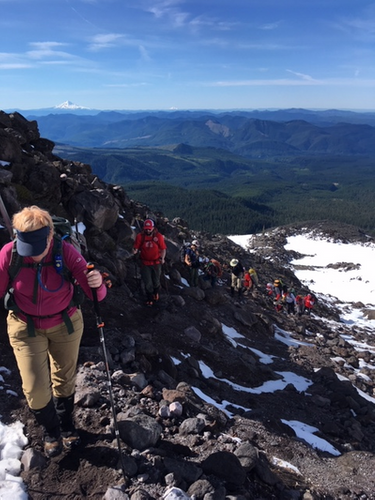Want to climb with us? The Mount St. Helens Institute offers a limited number of guided climbs to the summit of Mount St. Helens each year.
Climbing Mount St. Helens requires both physical and mental strength and stamina to make it to the summit (along with appropriate gear and favorable weather conditions). Once you've obtained a climbing permit, training in the months and weeks leading up to your climb can help you feel more confident, and prepare you for the terrain you may encounter on the climb.
Training can start out inside, but eventually plan to train outdoors. In addition to hiking on hills, you can train using a StairMaster, Treadmill, stadium stairs, bleachers, or household stairs. Your goal for training should be to comfortably hike 10-12 miles with 4,500-6,500 feet of elevation gain in a variety of weather conditions.
SUGGESTED TRAINING HIKES
If you live outside the Pacific Northwest, we suggest doing hikes in your local area or climbing stairs.
SEATTLE AREA
Mt. Walker (Olympics)
4.0 miles, 2000’
Burroughs Mtn. (Mt. Rainier)
9.0 miles, 2500’
Mt. Si (Snoqualmie)
8.0 miles, 3200’
Mt. Ellinor - lower trailhead (Olympics)
6.2 miles, 3300’
Mt. Townsend - lower trailhead (Olympics)
11.4 miles, 3400’
Mt. Rose (Olympics)
6.4 miles, 3500’
Granite Mtn. (Snoqualmie)
8.6 miles, 3800’
Mailbox Pk. - new trail (Snoqualmie)
9.4 miles, 4000’
Camp Muir (Mt. Rainier)
9.0 miles, 4600’
PORTLAND AREA
Saddle Mtn.
6 miles, 1630'
Saddle Mountain State Natural Area
Hamilton Mtn. (Hamilton Mtn. - Rodney Falls Loop)
7.5 miles, 2300'
Beacon Rock State Park
Dog Mtn.
6.9 miles, 2800'
Dog Mountain Trailhead
Larch Mtn.
14.4 miles, 4000'
Multnomah Falls Trailhead
Elk Mtn. - Kings Mtn. Loop (or Kings Mtn.)
10.8 miles, 3900' (or 4.8 miles, 2500')
Elk Creek Trailhead (or Kings Mountain Trailhead)
Mt. Defiance (Mt. Defiance - Starvation Ridge Loop)
12.8 miles, 5000'
Starvation Creek Trailhead

THREE MONTHS BEFORE THE CLIMB
ONE MONTH BEFORE THE CLIMB
ONE WEEK BEFORE THE CLIMB